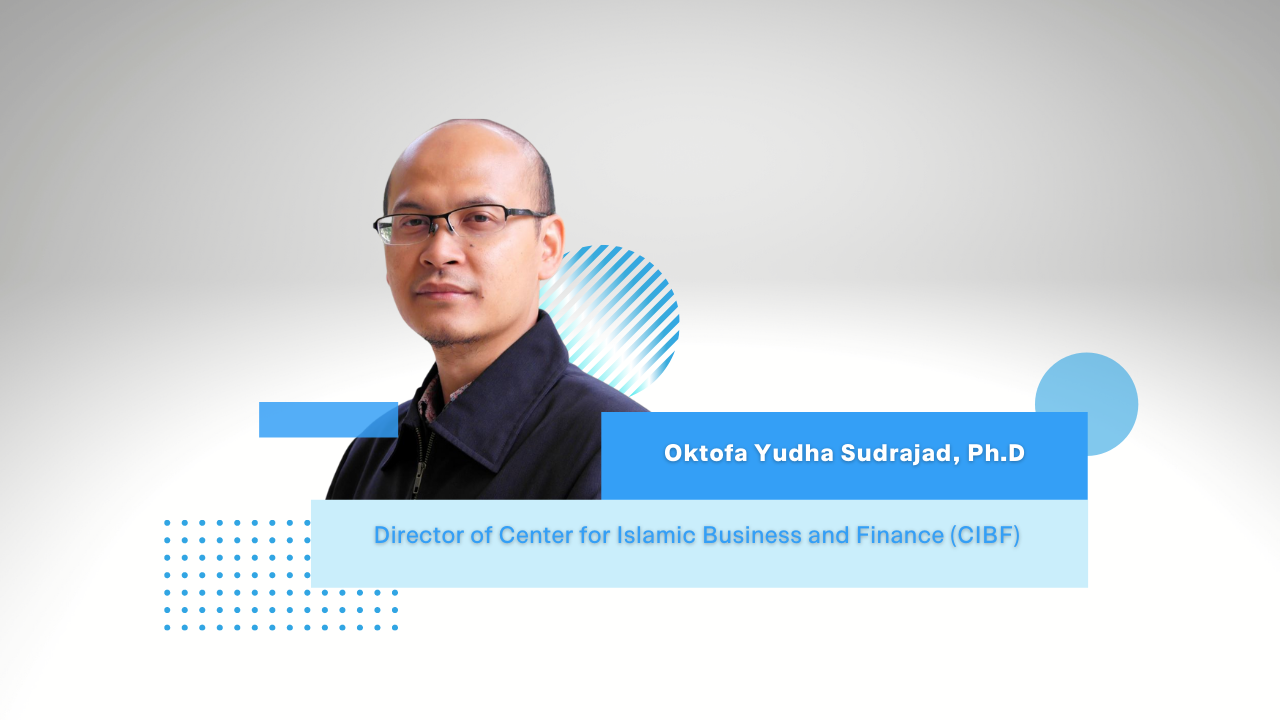Oktofa Yudha Sudrajat, S.T., M.S.M., Ph.D., is a lecturer and researcher of SBM ITB. He is also the Director of the Center for Islamic Business and Finance (CIBF) and belongs to the business risk and financial expertise group. His research interests is banking and finance, especially Islamic finance.
Yudha’s interest in Islamic finance, started when he noticed contradictions between existing economic systems. “If we notice existing economic systems such as capitalism and communism, both of which contradict each other, the one glorifies capital, and the other glorifies the state. From that, there is unbalance between those economic systems and affects the financial system,” Said Yudha who earned his Ph.D. in the Universite De Liege, Belgium in financial economic, and undergraduate as well as master degree in ITB, Wednesday (19/5/2021).
According to Yudha, Islamic finance not only has profit goals but also has a social mission. Different from other systems, Islamic economics tries to keep equality toward the prosperity of society. So, more research about Islamic finance is needed to make this field more advanced.
Furthermore, Yudha said that nowadays research about Islamic finance in Indonesia has started to develop hand in hand with the development of sharia institutions in Indonesia. In the 2000s, the research topics about this field were mostly about zakat, however, at this time the research began to expand to other topics such as sharia banking. “The research has begun to shift to Islamic finance institutions, namely, sharia banking, sharia insurance, multi-finance sharia, and sharia pawn shops. This is because of some principles that are needed in Islamic finance such as no usury, speculation, and no haram items.” Yudha said. Other than that, starting in 2007, Islamic capital markets and Islamic securities are also developing.
In SBM ITB, there is a center that studies business and Islamic finance named CIBF ( Center for Islamic Business and Finance). This institution was established in 2020 which has three main activities, namely research, training, and education. “What we are we doing in CIBF is a kind of community service in form of research by collaborating with other institution such as West Java government, we are also educating the community about Islamic finance one of them through webinar, and we also have a training program, but this program still not run yet due to pandemic,” he said. Yudha further explained that one of the research he did in CIBF is about zakat and waqf.
Zakat and waqf
Yudha found that, in 2021, Indonesia has a zakat potential of about IDR 300 trillion, however only 20% of them are absorbed. He revealed that, the small amount of waqf fund due to the lack of education for the society. “In People’s mind, they may know only about zakat which should pay fitrah during Ramadan, even though there are a lot of kinds of zakat such as zakat mal,” Yudha said.
Besides zakat, waqf also has a huge potential. If waqf is valued, Indonesia has IDR 300 trillion of waqf potential and if we add with the land the potential reaches IDR 2000 trillion, this amount is the same with APBN (State budget) of Indonesia. “ The potential of waqf in Indonesia is equal to APBN, this is an interesting topic,” Yudha said.
The development of Islamic Finance
Lastly, to develop Islamic finance, Yudha emphasized the importance of policy-based research. “ I hope that all of the activities related to sharia economics, Islamic Social Finance (ISF), halal industry, policy, and all the programs that will be planned are based on research,” He said. Yudha added that to further develop this field we also need support, synergy, and collaboration from various stakeholders.




